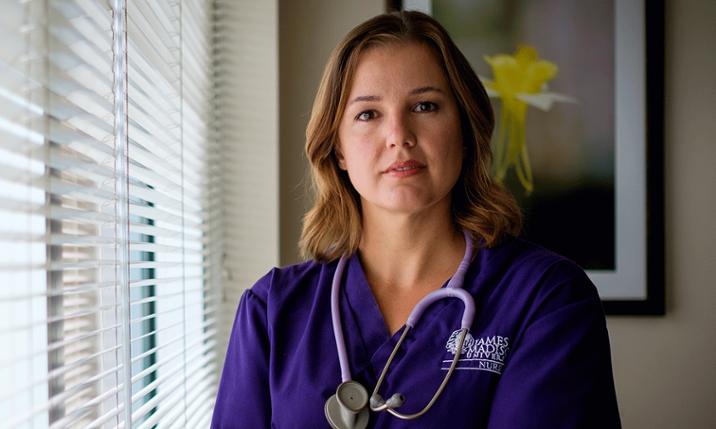Meeting the challenge of moral distress
Health and Behavior
SUMMARY: JMU nursing professor Erica Lewis helps health professionals learn effective techniques for coping with the mental distress of facing end-of-life and quality-of-care issues.
What happens when health professionals are faced with ethical situations they feel powerless to solve? A Q&A with Erica Lewis, assistant professor of nursing at JMU.

What is moral distress?
Moral distress is the complex response that results from a serious compromise to our moral integrity; when we choose to to do an action that violates our core values.
What are the symptoms of moral distress?
This state of discomfort can easily manifest itself through emotional and physical symptoms. Individuals experiencing moral distress may feel paralyzed — unable to reason when faced with future ethical dilemmas. Moral distress can be disguised as emotional exhaustion. However, the experience is distinct from emotional exhaustion because the distress is a result of our ethical value systems being compromised.
Is moral distress a common problem?
Many health and human service professionals, dealing with issues such as end-of-life care and quality of care, have been known to experience moral distress in their careers — in fact, the occurrence of moral distress has been most widely documented in these professionals. Moral distress has been experienced by those in business, military and educational settings.
What keeps us from acting after we make moral decisions?
An array of personal, environmental and practical constraints. A timid person who works on the lower rungs of a corrupt and rigid hierarchical system, for example, may very well feel disempowered to act. If that person has to make decisions quickly or lacks resources (such as a supportive group of coworkers), it’s highly unlikely that she will be able to act — even if she recognizes an ethical solution to a moral dilemma.
Can anything be done to prevent and treat moral distress?
While there is a lack of clear evidence to guide prevention and treatment of moral distress, recommendations based on anecdotal evidence can be offered. The most important way to prevent moral distress is to design an environment aimed at encouraging moral decision-making and empowering decision-makers to act. In these environments, typical constraints that oftentimes lead to moral distress should be removed.
But if designing a specialized environment seems impractical, individuals can work on ethical decision-making skills by using an inquiry-based framework, reflecting on past experiences, surrounding themselves with positive role models, role-playing and maintaining their well-being.
Are there tools that can help us develop ethical reasoning?
The James Madison University Eight Key Questions framework is one tool that can be used to guide moral reasoning. Being able to recognize an ethical dilemma and follow an established reasoning process allows for purposeful decision-making when faced with right and wrong — ethical decision-making can be nurtured with practice. Reflection before action helps eliminate retrospective regret and thoughtless action.
Meditative life practices, such as journaling, can also help us identify and solidify our moral values. Reflective practices allow us to recall, and grow from, prior experiences. Positive friends and mentors may also serve as supports to enhance resiliency during difficult times and prompt us to take moral action. If a difficult conversation is part of the ethical solution, then role-playing can help build confidence and fluency. Finally, overall well-being is important. Fatigue, in particular, can be a barrier to stepping up in difficult circumstances.
Is there anything else we can do to cope with the problem?
We can also help prevent moral distress in those around us. Support is important, both during and after experiencing a moral dilemma. Having someone present in the situation can make a big difference. We can offer to stand with others during their difficult time, role-play conversations in advance and ask for help using the appropriate chain of support.
